-

A “Deeper Dive”: The New Deduction of Tax at Source (Withholding) Regulations, 2024
0₦2,500.00Stephen Arubike and Adeyinka Adeoye in their article, A “Deeper Dive”: The New Deduction of Tax at Source (Withholding) Regulations, 2024, provide a comprehensive analysis of the Deduction of Tax at Source (Withholding) Regulations, 2024 (the “Regulations”), issued by Nigeria’s Minister of Finance and the Coordinating Minister of the Economy. Effective from January 1, 2025, the Regulations replace previous regulations on the subject, introduce several significant changes to the country’s withholding tax (WHT) regime. Key provisions include adjustments to applicable tax rates, expanded coverage of taxable entities, and a new emphasis on taxpayer identification numbers (TINs) to drive compliance. Arubike and Adeoye also address critical legal concerns raised by the Regulations, including conflicts with primary statutes, overreach in the Minister’s authority, and the unfair imposition of penalties on non-resident companies. While the Regulations aim to simplify WHT processes, reduce tax burdens on small businesses, and enhance tax compliance, several ambiguities and issues remain, particularly regarding non-resident taxation and penalties for non-compliance. Arubike and Adeoye conclude by discussing the transition period and its potential implications, as well as the need for further clarification on certain provisions to ensure fairness and legal consistency in implementing the Regulations.
-
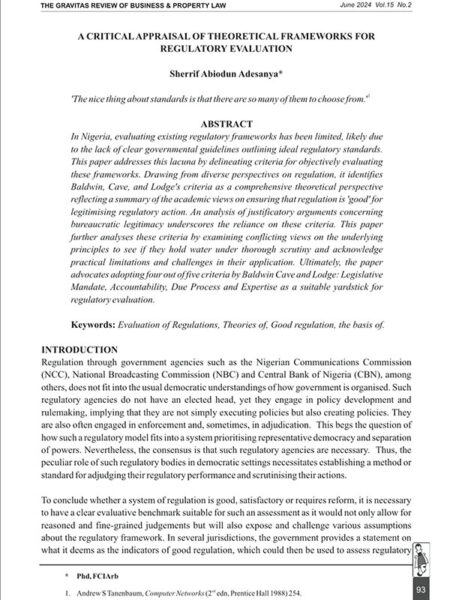
A Critical Appraisal of Theoretical Frameworks for Regulatory Evaluation
0₦2,500.00Sherrif Abiodun Adesanya, in his article, A Critical Appraisal of Theoretical Frameworks for Regulatory Evaluation, posits the need to have a theoretical basis for the evaluation of existing regulatory frameworks. Adesanya provides a set of criteria for the objective evaluation of these frameworks. Drawing from diverse perspectives on regulation, he identifies Baldwin, Cave, and Lodge’s criteria as a comprehensive theoretical perspective reflecting a summary of the academic views on how to ensure that regulation is ‘good’ for the purpose of legitimising regulatory action. An analysis of justificatory arguments concerning bureaucratic legitimacy underscores the reliance on these criteria. Adesanya analyses these criteria further by examining conflicting views on the underlying principles to see if these criteria hold water under thorough scrutiny and acknowledging practical limitations and challenges in their application. Ultimately, Adesanya advocates for the adoption of four out of five criteria put forth by Baldwin Cave and Lodge namely: Legislative Mandate, Accountability, Due Process and Expertise as a suitable yardstick for regulatory evaluation.
-
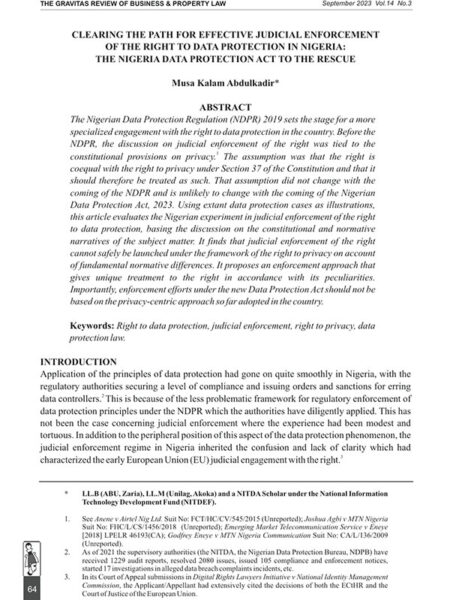
Clearing the Path for Effective Judicial Enforcement of the Right to Data Protection in Nigeria: The Nigeria Data Protection Act to the Rescue
0₦2,500.00Musa Kalam Abdulkadir, in his article, Clearing the Path for Effective Judicial Enforcement of the Right to Data Protection in Nigeria: The Nigeria Data Protection Act to the Rescue, examines the innovations introduced by the Nigerian Data Protection Regulation (NDPR) 2019, which sets the stage for the passing of the Nigerian Data Protection Act 2023. Before the NDPR, discussion on judicial enforcement of the right was tied to the constitutional provision on privacy. The assumption was that the right is co-equal with the right to privacy under Section 37 of the Constitution and that it should therefore be treated as such. That assumption did not change with the coming of the NDPR and is unlikely to change with the coming of the Nigerian Data Protection Act, 2023. Using extant data protection cases as illustration, this article evaluates the Nigerian experiment in judicial enforcement of the right to data protection, basing the discussion in the constitutional and normative narratives of the subject matter. It finds that judicial enforcement of the right cannot safely be launched under the framework of the right to privacy on account of fundamental normative differences. It proposes an enforcement approach that gives unique treatment to the right in accordance with its peculiarities. Importantly, enforcement efforts under the new Data Protection Act should not be based on the privacy-centric approach so far adopted in the country.
-
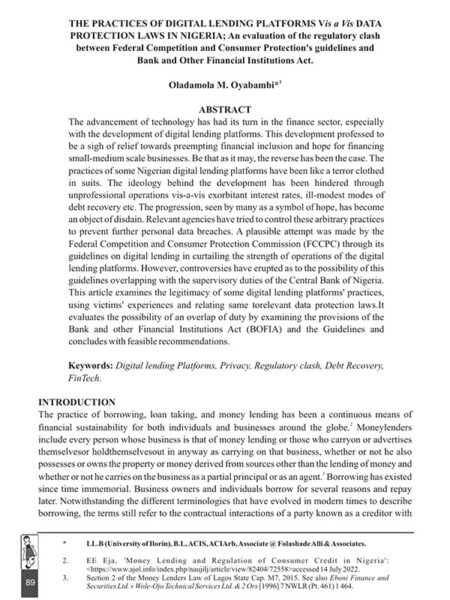
The Practices Of Digital Lending Platforms Vis A Vis Data Protection Laws In Nigeria
0₦2,500.00In his article, Practices Of Digital Lending Platforms Vis A Vis Data Protection Laws In Nigeria, Oladamola Oyabambi examines the legitimacy of the practices of some digital lending platforms, using experiences of victims and relating same with relevant data protection laws, Oyabambi evaluates the possibility of an overlap of duty by examining the provisions of the Bank and other Financial Institutions Act (BOFIA) and the Guidelines and concludes with feasible recommendations.
-
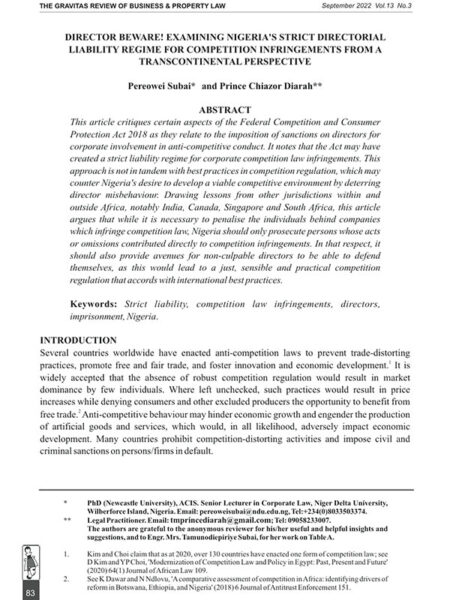
Director Beware! Examining Nigeria’s Strict Directorial Liability Regime for Competition Infringements from a Transcontinental Perspective
0₦2,500.00Dr Pereowei Subai, Senior Lecturer in Corporate Law at the Niger Delta University, Wilberforce Island, Nigeria and Prince Chiazor Diarah in their article, Director Beware! Examining Nigeria’s Strict Directorial Liability Regime for Competition Infringements from a Transcontinental Perspective, critique certain aspects of the Federal Competition and Consumer Protection Act 2018 (FCCPA) as they relate to the imposition of sanctions on directors for corporate involvement in anticompetitive conduct. They note that the FCCPA seems to have created a strict liability regime for corporate competition law infringements. This approach is not in tandem with best practices in competition regulation which may be counterproductive to Nigeria’s desire to develop a viable competitive environment by deterring directors’ misbehaviour. Drawing lessons from other jurisdictions within and outside Africa, the authors argue that while it is necessary to penalise the individuals behind companies which infringe competition law, Nigeria should only prosecute persons whose acts or omissions contributed directly to competition infringements.
-
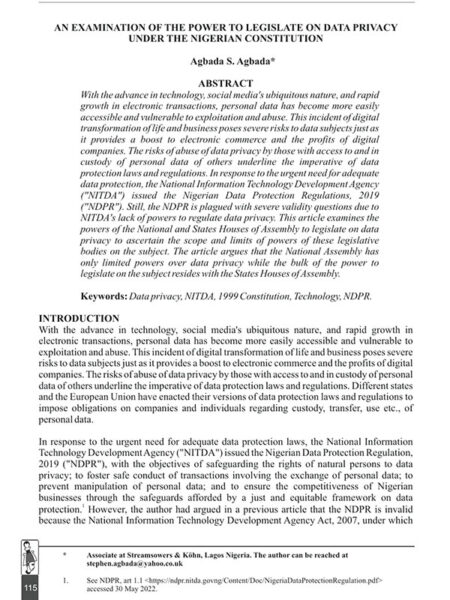
An Examination of the Power to Legislate on Data Privacy under the Nigerian Constitution
0₦2,500.00Stephen Agbada, Associate at Streamsowers & Köhn, in his article, An Examination of the Power to Legislate on Data Privacy under the Nigerian Constitution, notes that in response to the urgent need for adequate data protection, the National Information Technology Development Agency (NITDA) issued the Nigerian Data Protection Regulations, 2019 (NDPR). Does NITDA have the power to regulate data privacy? What is the difference between Data Privacy and Data Protection? Is Data Protection an Exclusive, Concurrent or Residual List item under the Nigeria Constitution? Agbada proffers his views on these pertinent questions in his examination of the powers of the National and States Houses of Assembly to legislate on data privacy.
-
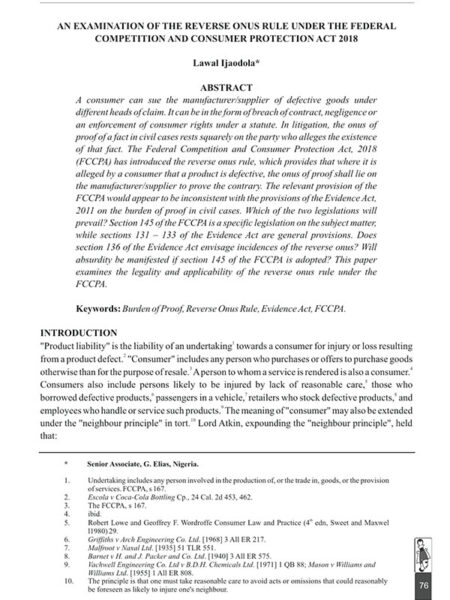
An Examination of The Reverse Onus Rule Under the Federal Competition and Consumer Protection Act 2018
0₦2,500.00Lawal Ijaodola, Senior Associate, G. Elias, in his article, An Examination of The Reverse Onus Rule Under the Federal Competition and Consumer Protection Act 2018, notes that a consumer can sue the manufacturer/supplier of defective goods under different causes of action. It can be in breach of contract, negligence, or an enforcement of consumer rights under a statute. In litigation, the onus of proof of a fact in civil cases rests squarely on the party who alleges the existence of that fact. The Federal Competition and Consumer Protection Act 2018 (FCCPA) has introduced the reverse onus rule, which provides that where it is alleged by a consumer that a product is defective, the onus of proof shall lie on the manufacturer/supplier to prove that the product is not defective. The relevant provision of the FCCPA would appear to be inconsistent with the provisions of the Evidence Act 2011 on the burden of proof in civil cases. Which of the two laws will prevail? Section 145 of the FCCPA is a specific legislation on the subject matter, while sections 131 – 133 of the Evidence Act are general provisions. Does section 136 of the Evidence Act envisage incidences of the reverse onus? Will absurdity be manifested if section 145 of the FCCPA is adopted? Lawal examines the contending issues and the legality and applicability of the reverse onus rule under the FCCPA.
-
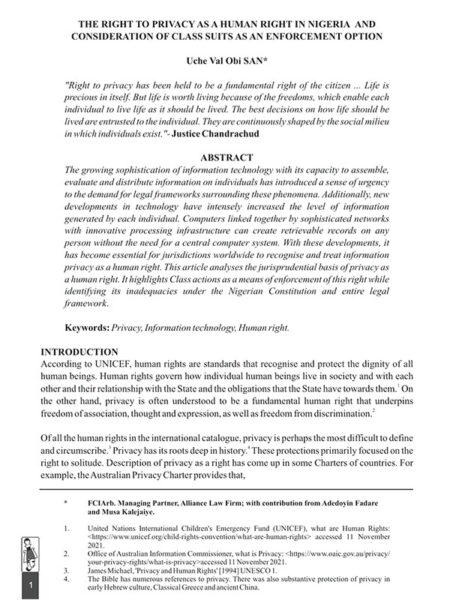
The Right to Privacy as a Human Right in Nigeria and Consideration of Class Suits as an Enforcement Option
0₦2,500.00Uche Val Obi SAN, Managing Partner, Alliance Law Firm, in his article, The Right to Privacy as a Human Right in Nigeria and Consideration of Class Suits as an Enforcement Option, notes that the growing sophistication of information technology with its capacity to assemble, evaluate and distribute information on individuals has introduced a sense of urgency to the demand for legal frameworks surrounding these phenomena. He argues that it has then become essential for jurisdictions worldwide to recognise and treat information privacy as a human right. Val Obi, SAN analyses the jurisprudential basis of privacy as a human right, constitutional and extant legislation on protecting and redressing privacy rights infringement in Nigeria. He highlights Class Action as a means of enforcement of privacy rights while identifying its inadequacies under the Nigerian Constitution and the entire legal framework.
-
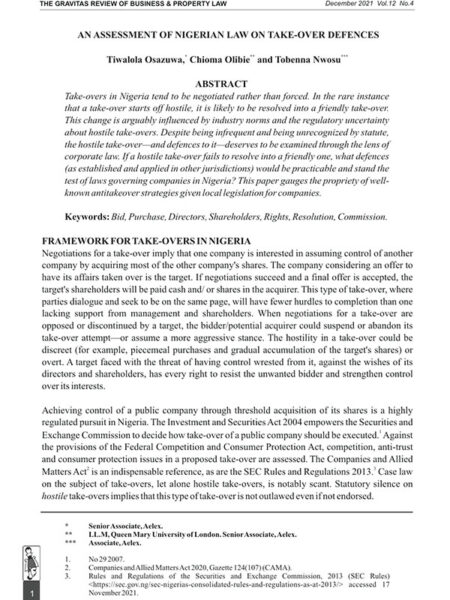
An Assessment of Nigerian Law on Take-Over Defences
0₦2,500.00Tiwalola Osazuwa, Chioma Olibie, and Tobenna Nwosu, all of Aelex in their article, An Assessment of Nigerian Law on Take-Over Defences, note that take-overs in Nigeria tend to be negotiated rather than forced. In the rare instance that a take-over starts off hostile, it is likely to be resolved into a friendly take-over. Though hostile take-over is unrecognised by statute in Nigeria, Osazuwa et al examine the framework for take-overs through the lens of corporate law. They consider take-over devices and defences and well-known anti-takeover strategies.
-
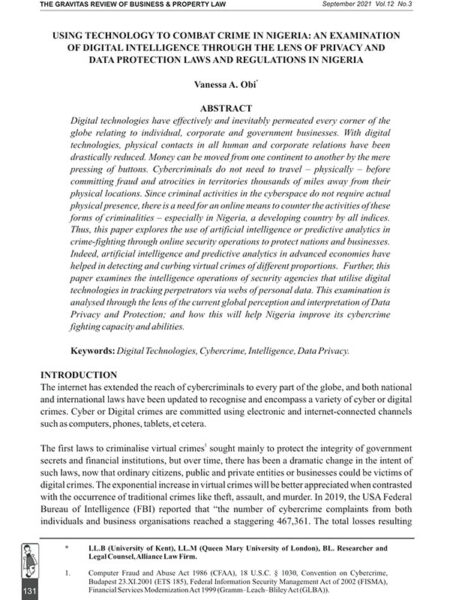
Using Technology to Combat Crime in Nigeria: An Examination of Digital Intelligence Through the Lens of Privacy and Data Protection
0₦2,500.00Vanessa Obi, Researcher and Counsel at the Alliance Law Firm, in her article, Using Technology to Combat Crime in Nigeria: An Examination of Digital Intelligence Through the Lens of Privacy and Data Protection, explores the use of artificial intelligence or predictive analytics in crime-fighting through online security operations to protect nations and businesses. Vanessa examines the intelligence operations of security agencies that utilise digital technologies in tracking perpetrators via webs of personal data. She examines these through the lens of data privacy and protection laws; and how this will help Nigeria improve its cybercrime fighting capacity and abilities.
-
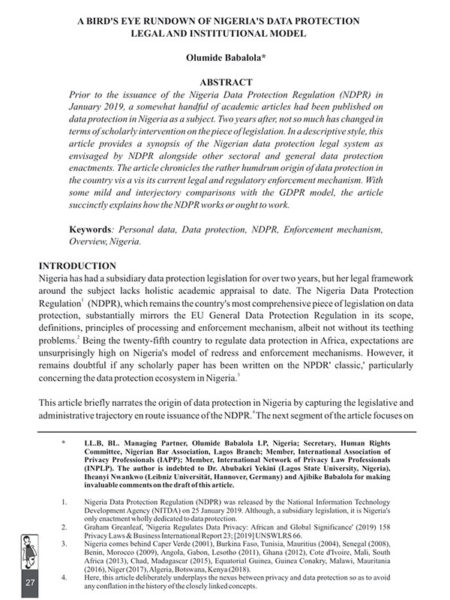
A Bird’s Eye Rundown of Nigeria’s Data Protection Legal and Institutional Model
0₦2,500.00Olumide Babalola of Olumide Babalola LP, in his article, A Bird’s Eye Rundown of Nigeria’s Data Protection Legal and Institutional Model, provides a synopsis of legislation and regulations dealing with data protection in Nigeria. He chronicles the rather humdrum origin of data protection in the country vis-a-vis its current legal and regulatory enforcement mechanism. Through comparisons with the General Data Protection Regulation (GDPR) model, Olumide explains how the Nigeria Data Protection Regulation (NDPR) works or ought to work.
-
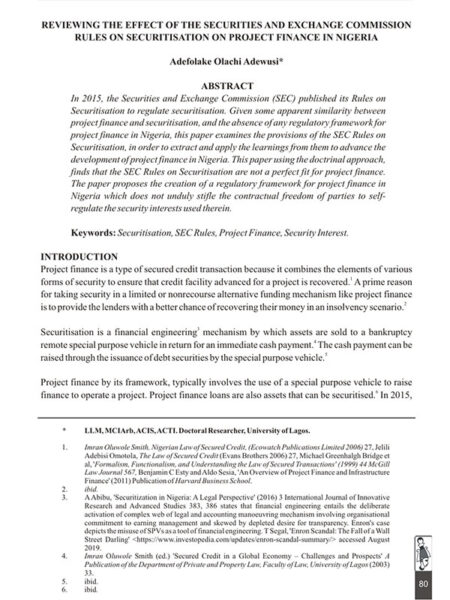
Reviewing the Effect of the Securities and Exchange Commission Rules on Securitisation on Project Finance in Nigeria
0₦2,500.00Adefolake Adewusi, Doctoral Researcher at the University of Lagos in her article, Reviewing the Effect of the Securities and Exchange Commission Rules on Securitisation on Project Finance in Nigeria, posits that the Securities and Exchange Commission (SEC) published its Rules on Securitisation in 2015 to regulate securitisation. Given the apparent similarity between project finance and securitisation, and in the absence of any regulatory framework for project finance in Nigeria. Adefolake examines the provisions of the SEC Rules on Securitisation to extract and apply the principles from them to advance the development of project finance in Nigeria. She argues that the SEC Rules on Securitisation are not a perfect fit for project finance and propose the creation of a regulatory framework for project finance in Nigeria which does not unduly stifle the contractual freedom of parties to self-regulate the security interests used.
The Gravitas Review of Business & Property Law


